So you want to get into the wonderful world of Gamification, Game Development and Game Theory?
Well, I couldn’t be more excited for you!
Game theory is the study of mathematical models of strategic interaction between rational decision-makers. It has applications in all fields of social science, as well as in logic, systems science, and computer science. In the field of economics, game theory is used to study the behavior of firms and consumers in various markets, as well as the decision-making processes of firms and governments.
In addition to its applications in economics, game theory has also been widely applied to political science, psychology, biology, and computer science. If you’re interested in learning more about game theory, many excellent books are available on the subject. We’ll provide a guide to the best books about game theory, covering various topics and perspectives.
Whether you’re a student, researcher, or just looking to learn more about this fascinating field, these books will provide a solid foundation in the key concepts and theories of game theory.
In this guide, I ranked and reviewed the Best Books About Game Theory, along with my top choices, so you can choose the best one for your needs.
Our Top Picks For the Best Books About Game Theory in 2023
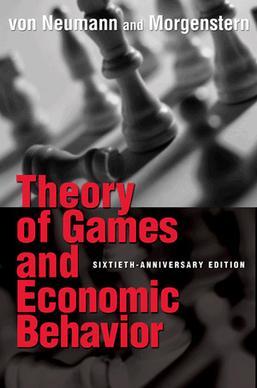
The Theory of Games and Economic Behavior
by John von Neumann
This book is considered a classic in game theory and is known for being the first to formalize the concept of a “game” in a way that could be analyzed mathematically.
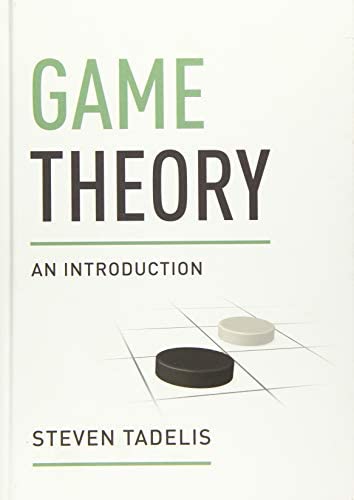
Game Theory: An Introduction
by Steven Tadelis
This book is known for providing a comprehensive and accessible introduction to game theory, making it a great choice for students or those new to the field.
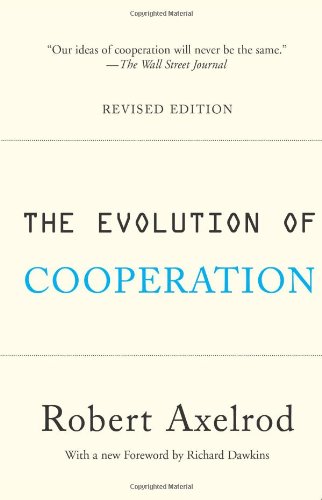
The Evolution of Cooperation
by Robert Axelrod
This book is known for its focus on the concept of cooperation and how it can emerge in situations where individuals are acting in their own self-interest.
What Are The Best Books About Game Theory?
Here is a summary of my picks for the Best Books About Game Theory in 2023. Each book has their own style of teaching and range of concepts, so choose one that is best suited for your interests.
- Our Top Picks For the Best Books About Game Theory in 2023
- 1. “The Theory of Games and Economic Behavior” by John von Neumann
- 2. “Game Theory: An Introduction” by Steven Tadelis
- 3. “The Evolution of Cooperation” by Robert Axelrod
- 4. “Prisoner’s Dilemma” by William Poundstone
- 5. “Thinking, Fast and Slow” by Daniel Kahneman
- 6. “Games of Strategy” by Avinash Dixit and Susan Skeath
- 7. “Essentials of Game Theory: A Concise, Multidisciplinary Introduction” by Kevin Leyton-Brown and Yoav Shoham
1. “The Theory of Games and Economic Behavior” by John von Neumann
The Theory of Games and Economic Behavior

Overview
“The Theory of Games and Economic Behavior” by John von Neumann and Oskar Morgenstern is a pioneering work in the field of game theory. First published in 1944, it is credited with laying the foundations of modern game theory and introducing the concept of a “game” as a formal object of study that could be analyzed mathematically.
The book is dense and technical, and may be more suitable for advanced students or researchers rather than those new to the field. However, for those looking to understand the fundamental principles of game theory, this book is an essential read. Its ideas have had a far-reaching impact, influencing not only economics but also fields such as political science, psychology, biology, and computer science.
Overall, “The Theory of Games and Economic Behavior” is a seminal work that continues to be highly regarded and widely studied in the field of game theory.
Key Chapters
- Two-Person Zero-Sum Games
- N-Person Games
- The Theory of Measurement
- The Equilibrium Concept for N-Person Games
- Applications
2. “Game Theory: An Introduction” by Steven Tadelis

Overview
“Game Theory: An Introduction” is a comprehensive and accessible introduction to game theory. Written by Steven Tadelis, a leading expert in the field, the book covers a wide range of topics in game theory, making it a great choice for students or those new to the field. The book is well-organized and easy to follow, with numerous examples and exercises to help readers understand the key concepts.
Overall, “Game Theory: An Introduction” is an excellent resource for anyone looking to learn about game theory.
Key Chapters
- Strategic Form Games
- Extensive Form Games
- Solution Concepts
- Repeated Games
- Bargaining
- Auctions
- Networks
- Mechanism Design
- Dynamic Games
- Information Economics
- Evolution and Behavioural Game Theory
- Epilogue: Game Theory in the Real World
3. “The Evolution of Cooperation” by Robert Axelrod

Overview
“The Evolution of Cooperation” is a book that explores the concept of cooperation and how it can emerge in situations where individuals are acting in their own self-interest. Written by Robert Axelrod, a leading expert in the field of game theory, the book is based on Axelrod’s famous iterated prisoner’s dilemma tournament, in which participants submitted strategies for how to play the prisoner’s dilemma game repeatedly against an unknown opponent. The book is known for its clear and engaging writing style, making it accessible to a wide audience.
Overall, “The Evolution of Cooperation” is a thought-provoking and influential work that is essential reading for anyone interested in the topic of cooperation.
Key Chapters
- The Evolution of Cooperation in the Iterated Prisoner’s Dilemma
- The Anatomy of Cooperation
- Variations on the Basic Model
- The Emergence of Cooperation in the Real World
- Cooperation in Social Dilemmas
- The Future of Cooperation
4. “Prisoner’s Dilemma” by William Poundstone
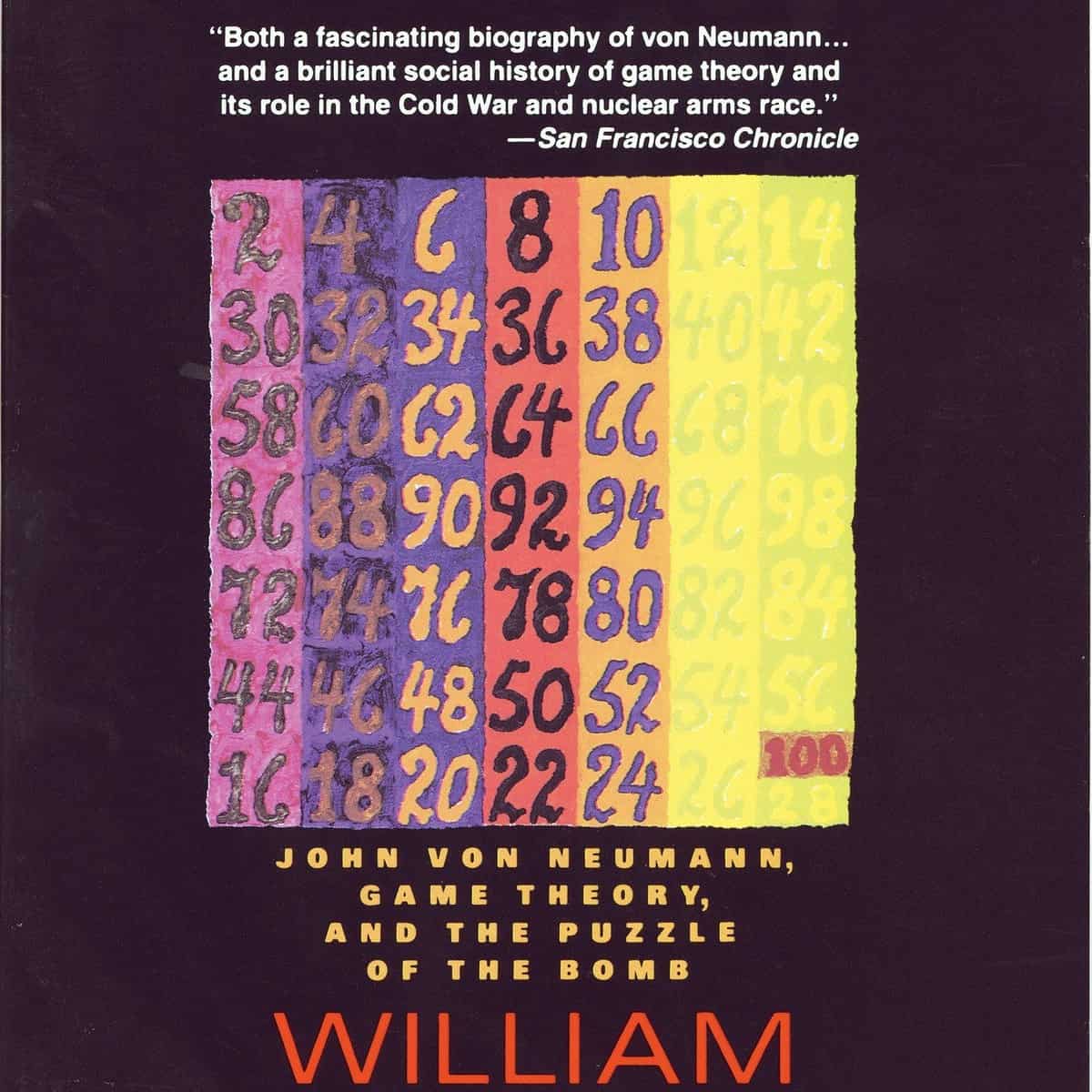
Overview
“Prisoner’s Dilemma” is a book that explores the famous game of the same name, which has been widely studied in game theory. Written by William Poundstone, the book is known for its engaging narrative style, which makes it a enjoyable read for a wide audience. The book covers the history of the prisoner’s dilemma game and its various applications, as well as the psychological and social factors that can influence how people play the game.
Overall, “Prisoner’s Dilemma” is a fascinating and informative book that is sure to appeal to anyone interested in game theory and human behavior.
Key Chapters
- The Origins of the Prisoner’s Dilemma
- The Anatomy of the Prisoner’s Dilemma
- The Iterated Prisoner’s Dilemma
- Cooperation in the Real World
- The Evolution of Cooperation
- The Future of the Prisoner’s Dilemma
5. “Thinking, Fast and Slow” by Daniel Kahneman
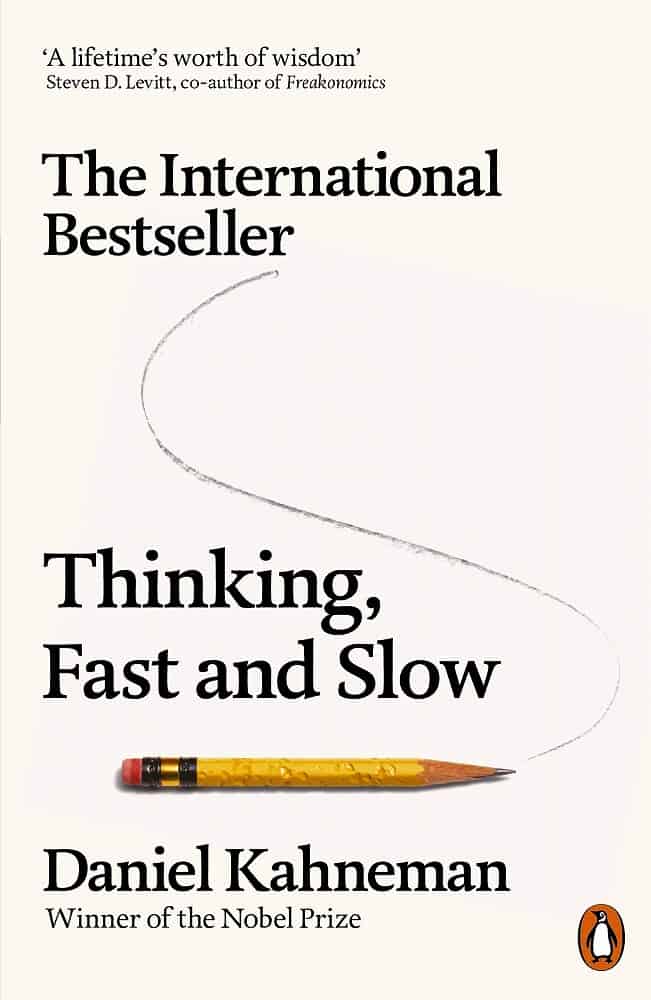
Overview
“Thinking, Fast and Slow” is a book that explores the psychological biases that influence human decision-making. Written by Daniel Kahneman, a Nobel laureate in economics, the book is based on Kahneman’s extensive research in the field of behavioral economics. The book is known for its engaging writing style and its insights into how our brains process information, and how this can lead to irrational or suboptimal decisions.
Overall, “Thinking, Fast and Slow” is a thought-provoking and influential work that is essential reading for anyone interested in the topic of decision-making.
Key Chapters
- Part I: The Characters of the Story
- Part II: The Associative Machine
- Part III: Overconfidence
- Part IV: Substitution, Salience, and Emotion
- Part V: The Inside and Outside View
- Part VI: A Machine for Jumping to Conclusions
- Part VII: The Psychology of Decision-Making
- Part VIII: The Stories We Tell
6. “Games of Strategy” by Avinash Dixit and Susan Skeath
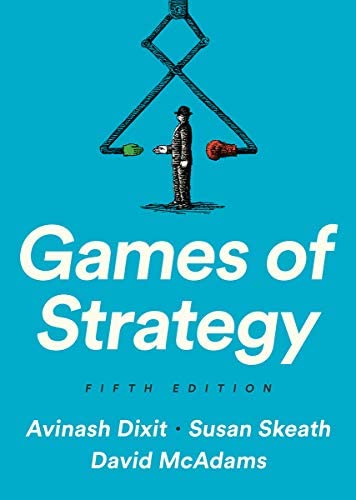
Overview
“Games of Strategy” is a book that covers a wide range of topics in game theory, from classic to modern. Written by Avinash Dixit and Susan Skeath, two leading experts in the field, the book is known for its clear and accessible writing style, as well as its comprehensive coverage of the subject.
The book includes numerous examples and exercises to help readers understand the key concepts, making it an excellent resource for students or anyone looking to learn about game theory.
Overall, “Games of Strategy” is a highly regarded and widely used textbook in the field of game theory.
Key Features
- Extensive Form Games
- Normal Form Games
- Mixed Strategies
- Repeated Games
- Evolution and Learning
- Decision Making Under Uncertainty
- Asymmetric Information
- Multistage Games
- Bargaining
- Auctions
- Network Games
- Mechanism Design
- Dynamic Games
7. “Essentials of Game Theory: A Concise, Multidisciplinary Introduction” by Kevin Leyton-Brown and Yoav Shoham
Essentials of Game Theory: A Concise, Multidisciplinary Introduction
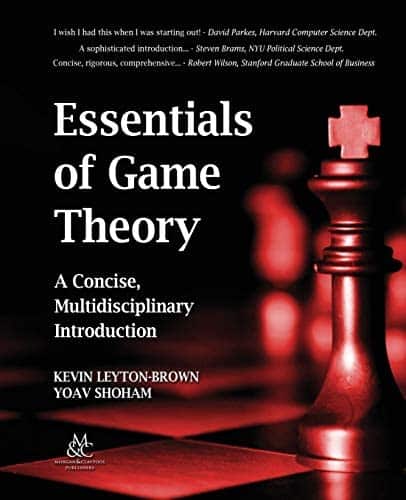
Overview
“Essentials of Game Theory: A Concise, Multidisciplinary Introduction” is a book that provides a concise yet comprehensive introduction to game theory. Written by Kevin Leyton-Brown and Yoav Shoham, two leading experts in the field, the book is known for its clear and accessible writing style, making it an excellent resource for students or anyone looking to learn about game theory.
The book covers a wide range of topics, from classic to modern, and includes numerous examples and exercises to help readers understand the key concepts. Overall, “Essentials of Game Theory: A Concise, Multidisciplinary Introduction” is a highly regarded and widely used textbook in the field of game theory.
Key Chapters
- Strategic Form Games
- Mixed Strategies
- Extensive Form Games with Incomplete Information
- Repeated Games
- Auctions
- Network Formation
- Mechanism Design
- Dynamic Games
- Epilogue: Game Theory in the Real World
Wrap Up – The Best Books About Game Theory

Game theory is a fascinating and useful field that has applications in a wide range of disciplines, including economics, political science, biology, and more. Whether you are a student looking to learn about game theory or an expert seeking a comprehensive resource, there are many excellent books on the subject to choose from. In this article, we have reviewed seven of the best books about game theory, covering a wide range of topics and offering something for everyone. As a next step, learn some JavaScript to go along with your newfound knowledge.
Whether you are interested in the classic works of John von Neumann and Oskar Morgenstern, the comprehensive introductions of Steven Tadelis and Avinash Dixit and Susan Skeath, the psychological insights of Daniel Kahneman, the focus on cooperation in Robert Axelrod’s book, the engaging narrative style of William Poundstone’s book, or the concise and multidisciplinary approach of Kevin Leyton-Brown and Yoav Shoham, there is a book on this list that is sure to meet your needs.
Read More: What Is The Best Mouse For Programming? (Reviews For 2023)




